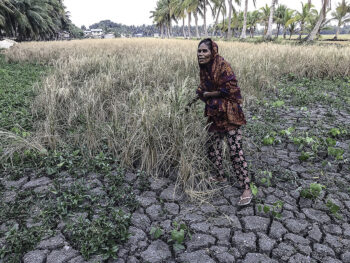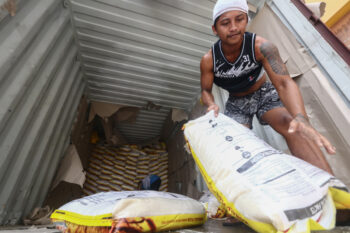(Privilege Speech delivered by Maguindanao 1st district Rep. Bai Sandra S. A. Sema at the House of Representatives on Monday, February 16)
Assalamu Alaikum Warahmatullahi Wabarakatuh. Assalamu Alaikum means peace be upon you.
In the early morning of January 25, about 400 civilian officers and men of the Philippine National Police marched to Tukanalipao, Mamasapano, Maguindanao. According to Wikipedia:
“A police operation took place on Sunday, January 25, 2015, at Tukanalipao, Mamasapano, Maguindanao, between the Special Action Force (SAF) of the Philippine National Police (PNP) (allegedly joined by United States Army Special Forces and the Federal Bureau of Investigation) and the Bangsamoro Islamic Freedom Fighters (BIFF) and the Moro Islamic Liberation Front (MILF).
“Originally a mission to serve arrest warrants for high-ranking terrorists, it led to the deaths of 44 members of SAF, at least 18 from MILF and 5 from the BIFF, and several civilians, and the death of Zulkifli Abdhir confirmed by the FBI and the PNP at 6:30 p.m. of February 4, 2015 due to a matching DNA result. He was one of the wanted terrorists. Getulio Napeñas estimates about 250 casualties from the combined MILF, BIFF, and private militias during the encounter.[18] The mission was called Oplan Exodus, initially misattributed as Oplan Wolverine by the local media. Oplan Wolverine refers to three of the other nine prior operation attempts targeting Marwan; Oplan Wolverine 1, 2 and 3 launched in December 2012, March and May 2014 respectively.[21][23] by the PNP-SAF. The incident caused the Philippine Congress to halt the passage of the Bangsamoro Basic Law, effectively endangering the peace process between the government and the MILF.
“The Federal Bureau of Investigation later participated in identifying Zulkifli’s body.”
Mr. Speaker, this Representation is very much disturbed by the events that took place as a result of the Mamasapano Incident. I have not seen so much hatred thrown against the Bangsamoro — not since the signing of the 1996 Final Peace Agreement, and I have not heard any call for an All-Out War against us — not since the Camp Abubakar incident. Like my constituents in the first district of Maguindanao and Cotabato City, and in the entire Bangsamoro Homeland, I am hurt by the anti-Moro sentiments that now flood the social media. I am stunned to know that national prejudice against the Muslims remains very strong.
Our Constitution declares that the Philippines renounces war as an instrument of national policy, adopts generally accepted principles of international law as part of the law of the land, and adheres to the policy of PEACE, EQUALITY, JUSTICE, FREEDOM, COOPERATION, and amity with all nations.
What is peace? How can ordinary people help? There must be peace in our words. There must be peace in our actions. But, most of all, there must be peace in our hearts.
Peace is working together as one for progress and for our country. In spite of personal, cultural, religion and worldview differences, we are being encouraged to be at peace with one another. Having peace with others means no discrimination, no oppression, no prejudice, and no war.
Peace in our words
Our tongues can speak good things as well as evil things. Our mouths can proclaim the truth as well as speak lies. Our words may be a weapon of incredible potential that we can do great good with or create great harm to ourselves and others. We must release from our mouth stories of good deeds rather than evil deeds, speak about the great good and not about the great harm.
Last week, I was greatly alarmed when the atrocities in Mamasapano, Maguindanao was at the brink of being shown to the general public. Forty-four SAF Members commanded by General Napenas died. He claims that 250 Muslims also died. I had to make the timely objection, Mr. Speaker. One error was committed, another followed, and many were murdered either intentionally or in self-defense because of the error which was the cause of the cause of the evil caused. When crimes are done on both sides, shouldn’t we commit ourselves to silence and ask God’s forgiveness that blood had been spilled on our land? There can be no peace unless we learn how to guard our tongues.
Peace in our deeds
The ongoing investigation on the Mamasapano incident has turned rather unfair. We are merely looking into what happened to the PNP-SAF which and even dubbed it as a “Massacre.” We have become oblivious to the fact that there were civilians killed. Perhaps, we know the names of the PNP SAF; BUT we have not cared to know the names of the civilians killed or injured. The civilian victims are treated as collateral damage. None of us have given attention to their fate and to the families that they left behind.
Mr. Speaker, the Mamasapano incident has clearly inflicted damage on the lives of the families of the civilians killed and on the lives of those injured. In all the ongoing investigations, is the State willing to indemnify the civilian victims in case we find our agents to be negligent? Who will file the cases on behalf of the helpless civilians? Or, are they going to be another forgotten Cause?
In retrospect, Mr. Speaker, the Moro people have had their own share of massacres.
We are still grieving the massacre of thousands of civilians by the martial law regime particularly in Palimbang in 1974 where more than 1500 civilian men were systematically killed in different masjids in Malisbong, Palimbang, while their women were raped in a gunboat just across shore.
We are still grieving for the civilian victims of the Manili Massacre in 1971 in Carmen North Cotabato.
We are still grieving for the civilian victims of the Tacub Massacre also in 1971, in Kausawagan, Lanao Del Norte.
We are still grieving for the civilian victims of the Maimbung Massacre in Maimbung, Sulu in 2008.
And who can forget the Jabidah Massacre in Corregidor (in 1968)?
We are still grieving. We are still crying for justice, we are still demanding indemnification!
Our grief for the victims of these massacres is as much as our grief for the death of the 44 PNP SAF.
I am not saying that the death of the PNP SAF was less painful. I am only emphasizing that in our search for truth and justice, fairness must be an indispensable element that applies equally to the civilian victims as well.
Mr. Speaker, we feel alone in our fight to make the whole nation aware that we the Bangsamoro can only take so much of the bashing and discriminating statements hurled against us and of the horrifying calls for another All-Out War in the Bangsamoro Homeland. We have had enough of the disregard of our feelings. We have had enough of the animosity of those who call for All-Out War but have not even heard sound of cannons and aerial bombardments and who have not even experienced living in tents. It is easy to say “kill the Moros”, “bomb the Moros” but mind you our people have gotten used to finding it easier to fight back in the face of oppression. Nonetheless, rest assured that I and the millions of Moros have had enough of war and violence and we have adopted what the famous Albert Camus said “Peace is the only battle worth waging.”
Peace is directly related to our actions and attitudes. As valuable as peace is, it is not surprising to find that it is sometimes counterfeited. Empty promises of peace can be used to manipulate others.
Deceitful men speak words of peace while secretly planning evil. Leaders usually deal only with the symptoms of the national problems, without addressing the root of the crisis.
We must all seek peace. We should all make every effort to do what leads to peace. Of course, there will be some people who do not desire peace, but we are still to do our utmost to be at peace with all of them.
Once there is peace in our hearts, we are able to share that peace with others; we become publishers of peace and ministers of reconciliation.
Peace in our hearts
Mr. Speaker, the investigation of the Mamasapano clash is now becoming not an investigation per se but has become a stage for jeopardizing the Bangsamoro Basic Law. It has fanned animosity against Muslims and it has diminished support for the passage of the draft BBL. It is in this context that I am asking each and every one of us in this Hall of Congress to find another means of threshing out the truth we want to find out— by some other means, maybe in executive session, that will not fan hatred and discrimination.
What is in our heart is the central issue. Our outward appearance, our showmanship, our performance, or the smiles pasted on our faces do not really matter much. What is important is who we really are on the inside, and therefore we should guard our character. We ought to consider the state of our hearts because it will affect everything we think, do, and say.
We should dwell on what is true, what is honorable, what is right, what is pure, what is lovely, what is of good repute, what is excellent, and what is worthy of praise.
But if our thoughts are compromised as we take in evil thoughts, we will quickly begin to treasure evil things. This fault of the mind and heart can quickly carry over into errors of word or deed.
I ask you to pray for me and our leaders that we may have peace in our words, in our deeds, and most especially in our hearts.
A veteran journalist said: The ultimate tragedy is when we kill the peace to honor the dead.
Assalamu Alaikum Warahmatullahi Wabarakatuh. May the peace of God be upon you.
(Privilege Speech delivered by Maguindanao 1st district Rep. Bai Sandra S. A. Sema at the House of Representatives on Monday, February 16)







